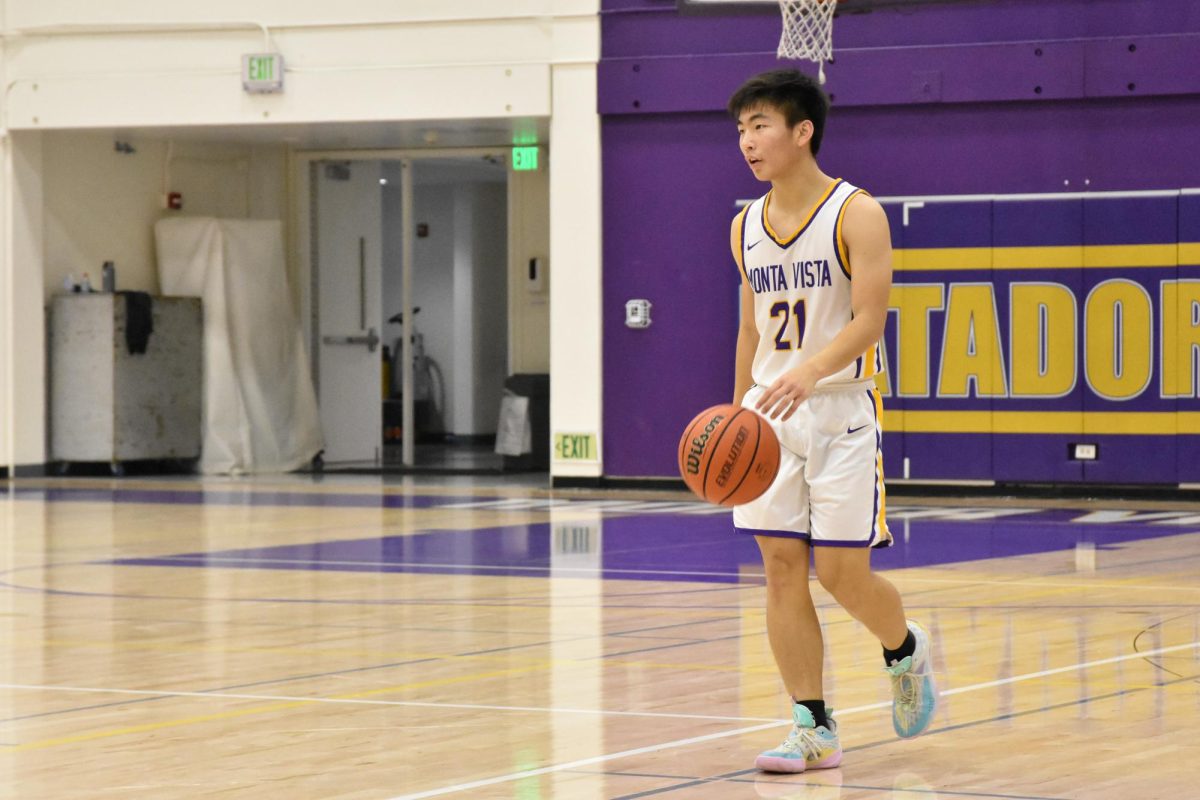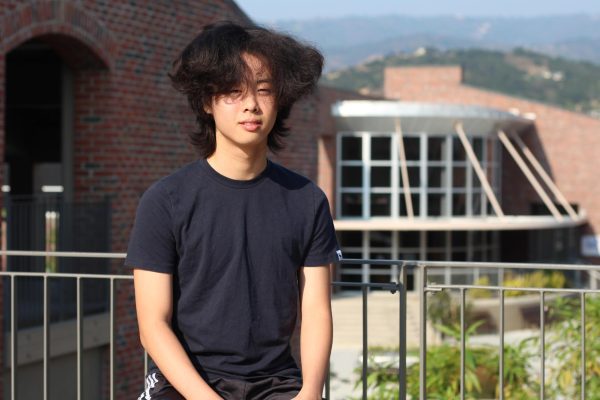AR: Hi, I’m Aidan and welcome to Episode 26 of Time Out! Each episode, we will be exploring the journeys of various athletes here at Monta Vista High School. In this episode, I am joined by junior Stanley Du, who is a captain on the Varsity Boys Basketball team.
AR: What position do you play on the school team here?
SD: I play guard.
AR: And when and how did you start your basketball journey?
SD: I probably just had a ball at my house when I was in kindergarten, so that’s probably the first time I touched the ball. I think I started actually playing after I got cut in sixth grade, so that was fun.
AR: You mentioned that you joined club sports. So was that a major part in why you continued basketball into high school?
SD: I’d say it definitely helps you get better, so in that aspect, definitely.
AR: And why did you decide to join basketball out of all of the sports?
SD: I think it was just a team sport for me, and I used to play badminton and tennis, but it wasn’t as fun for me because it wasn’t a team sport. I kind of enjoyed the bonding aspect, like you bond with your teammates and you go out to eat with your teammates. That’s a big reason why I play basketball.
AR: Was this the same with both playing in a club as well as playing on a school team?
SD: Yeah, I definitely had like a bunch of teammates that I was really close with in club. I really liked driving to games with them, especially the long AAU games and that was honestly a really fun part for me, and similar in high school, we get team dinners and that’s really fun for me as well.
AR: If you could reflect back on your history as a basketball player, how would you say that you have grown over the years, as either both a player, in technical skills, or just as a person?
SD: I mean, as a player, you work on your game, you go to clinics, you get new moves, you watch basketball players, you’re gonna add stuff to your game naturally as time goes by. But I think as a person, you just meet a lot of people and that part alone is really rewarding. You make friends and bond with other people and talk to people and make new friends.
AR: So what do you say that you’ve gotten close with not just your own team, but other teams as well?
SD: Yeah, you know people from other teams because you’ve played them a lot and you know how to interact with strangers because you’re talking to people you don’t really know often, and I think that’s good because it helps me socialize.
AR: And is there anything that you would attribute your growth to? It could be a mentor, a player, a rival or even yourself.
SD: Probably just my coaches. They tell you to be vocal and communicate and I think that’s really important in terms of not just basketball, but just making friends and getting out there and talking to other people.
AR: In what ways have you seen these skills that you learned in basketball translate to real life?
SD: I think just being vocal about everything, like communication is key and you want your voice to be heard if you want to get what you want. So I think speaking up for yourself and not hesitating to speak what’s on your mind is something that’s big in terms of translating from basketball to real life.
AR: As someone on the Monta Vista Basketball team, in what ways did it differ from your previous experience as a club player?
SD: I think in high school basketball, the possessions matter a lot more. You start to question your shots a lot more. You lose your confidence a little bit because, in AAU, your shots don’t really matter. If you have a bunch of bad possessions in a row, it’s not the end of the world. But in high school, you have a few bad possessions and you lose the game. And it’s a big deal, really, if you lose a league game, or you drop a game that you had to win because you want to make CCS. So I think, you just lose your confidence playing in high school a little bit.
AR: But overall, would you say that the team is an enjoyable experience, despite the pressure?
SD: Yeah, definitely. I think it’s a lot harder. We have a lot more workouts, and you go a lot harder, too. So that’s something I really enjoy, just like pushing myself.
AR: And have you seen this with other members of the team as well?
SD: I’d say I’ve seen both for other members of the team. Some people enjoy it, some people don’t. That’s why some people quit and other people keep going.
AR: Will you continue to play basketball in the future?
SD: Well, I’ve thought about that one. I don’t even know myself. I’d say, I have no idea.
AR: But if you could possibly continue it, would you take that opportunity?
SD: If it was for college basketball, I don’t know if I would, just because I feel like I wouldn’t be able to play at that high of a level of college basketball, and I think watching the game is enough for me.
AR: As a student athlete, of course, there’s going to be lots of challenges with time management. How exactly did you manage your time despite playing basketball? Because you mentioned there’s lots of workouts, lots of after school commitments, etc.
SD: I think just trying to be productive in school is a big one. Especially, before games, it’s hard to do homework because you’re excited about the game. After the game you get tired. So honestly, a big one is being productive in school and using school time well, because it’s easier to focus at a school setting for me personally. So I think when I get most of my work done at school or putting a certain time in my day to dedicate it to homework on the weekends and just get everything done is a big one. So that when the weekdays come and I have all the games, I don’t have to worry about homework.
AR: As captain of the basketball team, are there any improvements that you hope to make with the team?
SD: Trying to get the team together, not just on the court, but off the court. Having a strong bond off the court definitely helps with playing on the court. In previous years. We haven’t had a strong connection, so I think having a sense of togetherness as a team will help us a lot during the season because, during the season, obviously we want to win games so having that sense of togetherness is a big one for us.
AR: But overall, what do you say that there are any benefits that playing basketball has brought you all these years?
SD: It helps with mental health because I think it’s important to talk to other people and connect with other people. And basketball is a great opportunity to interact with a lot of people playing basketball. And just overall it helps a lot with my mental health.
AR: And were there any challenges throughout all these years and did you do anything to overcome them?
SD: I’d say a big challenge in high school basketball is staying in shape. Keeping your legs fresh throughout the whole year. It’s easy to get fatigued towards the end of the season, both because of sleep and because we have finals during our season, it can really start to take a toll when you don’t get your sleep in and it definitely affects your performance a lot when you don’t get your sleep. So I think it’s important to stay on top of things but it’s always a challenge to get your sleep in and stay ready and rested for all your games and practices.
AR: That’s it for Episode 26 of Time Out! Thank you to Stanley for joining me today. I’m Aidan and thanks for tuning in.







